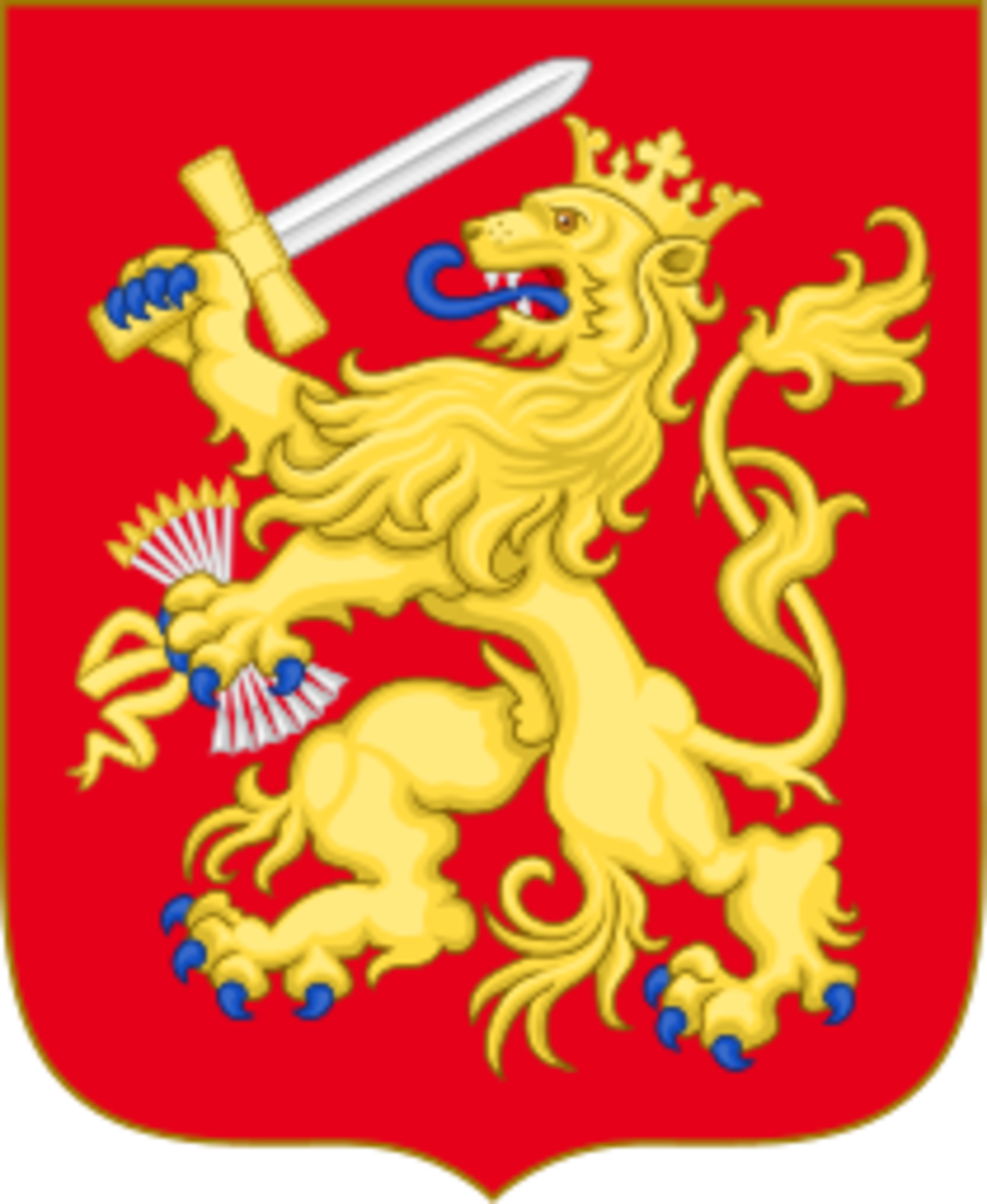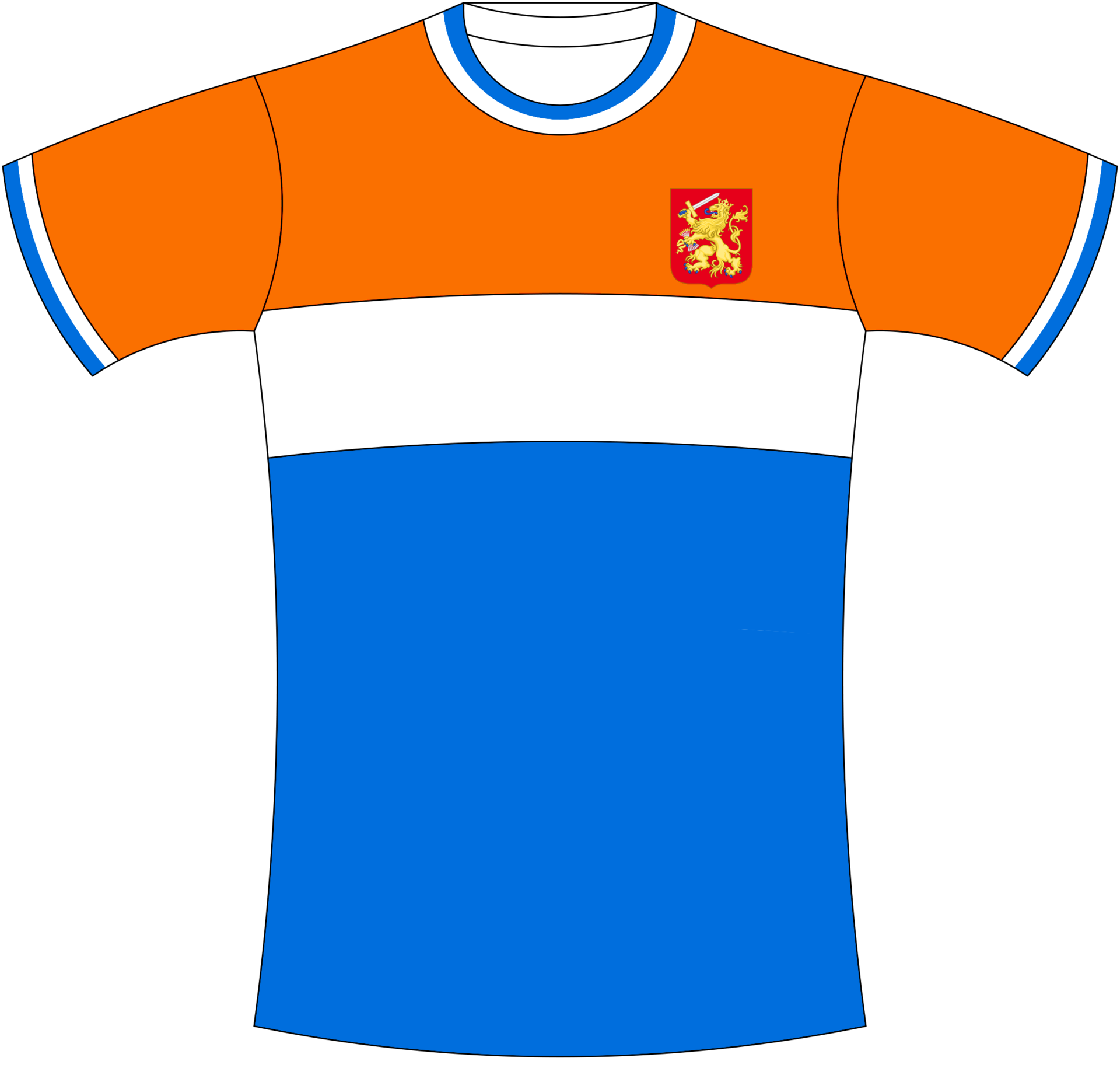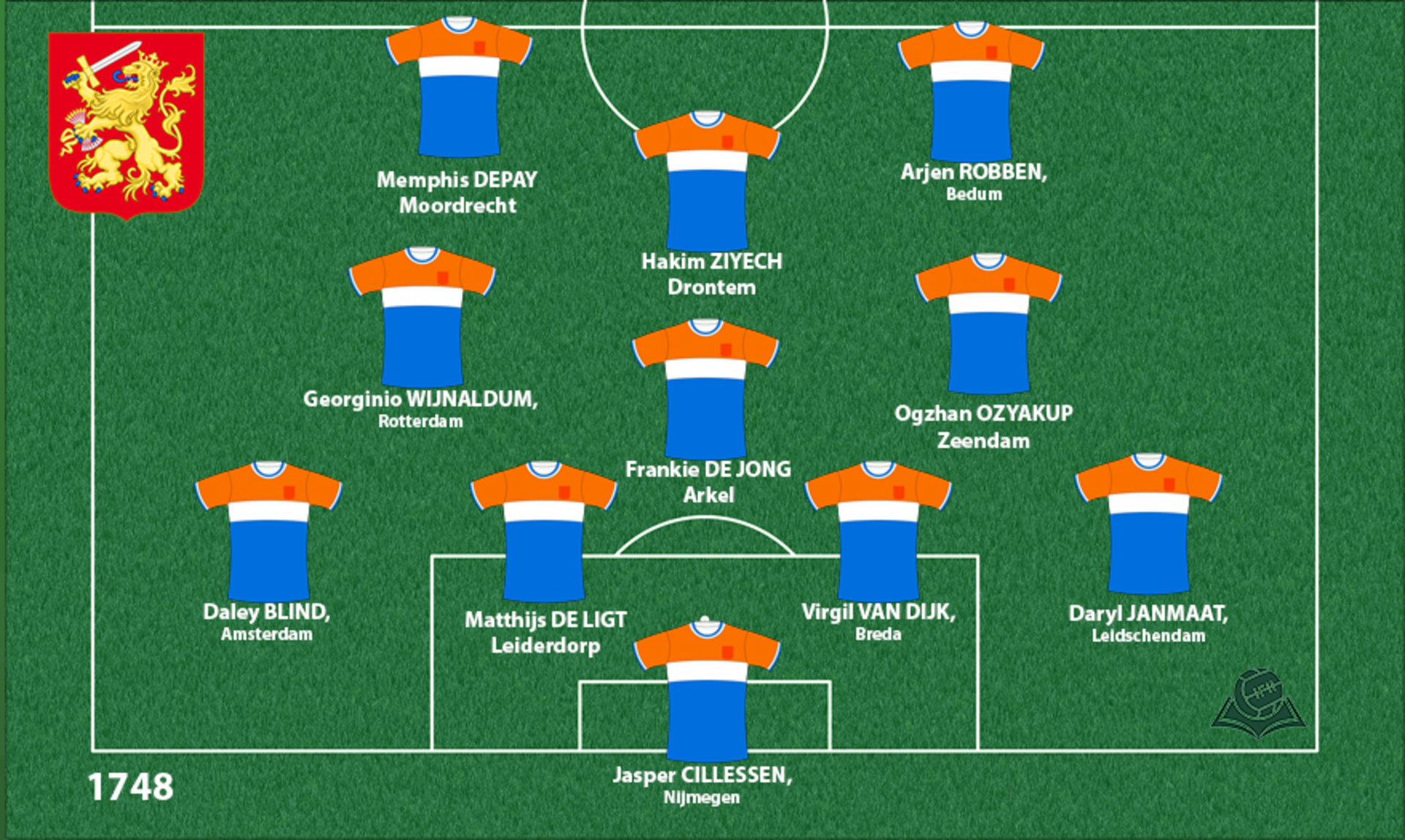Republic of the Seven United Netherlands
From the self-declaration of independence from the Spanish Habsburgs in 1580 to the end of the 18th century, The united Protestant provinces, which could scarcely be called a state, used many official names: the Republic of the Seven United Netherlands, the Republic of the Seven United Provinces, the Belgian Federation, etc. The unifying element was the Orange House, which had clients and followers everywhere.

Coat of arms

Shirt
| Position | First name | Last name | Mjesto rođenja | Like | Dislike | |
|---|---|---|---|---|---|---|
| GK | Jasper | CILLESSEN | Groesbeek |
2 |
2 |
|
| GK | Jeroen | ZOET | Veendam |
1 |
0 |
|
| DC | Jeffrey | BRUMA | Rotterdam |
2 |
0 |
|
| DC | Matthijs | DE LIGT | Leiderdorp |
2 |
0 |
|
| DC | Stefan | DE VRIJ | Ouderkerk aan den IJssel |
4 |
1 |
|
| DC | Virgil | VAN DIJK | Breda |
10 |
2 |
|
| DC | Wesley | HOEDT | Alkmaar |
2 |
0 |
|
| DLC/DMC | Daley | BLIND | Amsterdam |
5 |
1 |
|
| DLC/DMC | Nathan | AKE | Den Haag |
2 |
0 |
|
| DR | Daryl | JANMAAT | Leidschendam |
2 |
0 |
|
| DR | Denzel | DUMFRIES | Rotterdam |
2 |
0 |
|
| DR | Kenny | TETE | Amsterdam |
2 |
1 |
|
| DL | Patrick | VAN AANHOLT | 's-Hertogenbosch |
2 |
1 |
|
| DMC/DC | Frenkie | DE JONG | Arkel |
3 |
0 |
|
| MC | Georginio | WIJNALDUM | Rotterdam |
4 |
2 |
|
| MC | Kevin | STROOTMAN | Ridderkerk |
4 |
1 |
|
| MC | Oğuzhan | ÖZYAKUP | Zaandam |
2 |
0 |
|
| MLC | Tonny | VILHENA | Maassluis |
2 |
0 |
|
| AMC | Davy | KLAASEN | Hilversum |
2 |
0 |
|
| AMC | Hakim | ZIYECH | Dronten |
4 |
2 |
|
| AMC | Wesley | SNEIJDER | Utrecht |
7 |
0 |
|
| AMRL | Arjen | ROBBEN | Bedun |
9 |
0 |
|
| AMRL | Justin | KLUIVERT | Zaandam |
2 |
0 |
|
| AMRL | Memphis | DEPAY | Moordrecht |
2 |
0 |
|
| AMRL | Quincy | PROMES | Amsterdam |
3 |
2 |
|
| FRLC | Steven | BERGWIJN | Amsterdam |
2 |
0 |
|
| FLC | Ryan | BABEL | Amsterdam |
2 |
0 |
|
| FC | Bas | DOST | Deventer |
1 |
0 |
|
| FC | Klas Jan | HUNTELAAR | Voor-Drempt |
1 |
0 |
|
| FC | Robin | VAN PERSIE | Rotterdam |
4 |
0 |
|
| FC | Vincent | JANSSEN | Heesch |
3 |
0 |
The Eighty Years War ended in 1648 with the recognition of the independence of Protestant provinces from the Habsburgs of Spain, but at the same time the issue of a tighter or looser alliance of the republic and the domination of the province of Holland repeatedly gave rise to bloody political clashes between supporters of the Oranje-Nassau dynasty and Republicans, and mounted political processes , political lynchings and coups have occurred several times. The control of strategic areas in the Americas and Africa and the rule of islands in the Far East established the foundations for a maritime economy of world dimensions, for which the Dutch invented trading companies, designed as mechanisms that would derive the greatest economic benefit from the colonies and international trade.
A worldwide trading company Dutch East India was founded in the province of Holland in the early 17th century. Related to this is the story of the erroneous synonymous use of the Netherlands and Holland names, since most overseas merchants came from the latter province. The East Indies Company obtained a monopoly on trade through the Cape of Good Hope and Magellan Passage as well as the right to establish and maintain trading bases in the East Indies. Dutch ships and undertakings are everywhere: in the Baltic, where they rule commerce for Russia and from Russia, and in northern Europe, or in the open sea of the Scottish coasts, or in the south Atlantic, in the seas of Africa, in the French ports, in the Mediterranean, in the Levant, in Asia Minor and Syria.
From an ethnic, linguistic and religious standpoint, the young republic represented a complex reality. Dutch was spoken in the western provinces, but not in the eastern provinces. The dominant religion was Calvinist, but strong minority Catholics and Anabaptists survived, as did numerous wealthy Jewish communities. Although the state was not deprived of sharp religious conflicts, it nevertheless proclaimed religious tolerance for opening the door to a large number of persecuted Protestants and Jews from other European countries, which also attracted more skilled masters, scholars, thinkers. Also, for the commercial oligarchy, practicing tolerance was a condition of progress and success. However, with a series of unsuccessful wars against England (later Britain), its power will gradually decline.
Sources
- Grupa autora, Povijest: Počeci novog doba (16. stoljeće), knjiga IX., Zagreb 2008.
- Grupa autora, Povijest: Doba apsolutizma (17. stoljeće), knjiga X., Zagreb 2008.
- Alexander BUCZYNSKI, ''Nizozemska multikultura'', http://www.matica.hr/hr/347/NIZOZEMSKA%20MULTIKULTURA/
- ''Why did Holland change its name?'',https://www.quora.com/Why-did-Holland-change-its-name-to-the-Netherlands
- Coat of arms: https://en.wikipedia.org/wiki/Coat_of_arms_of_the_Netherlands
